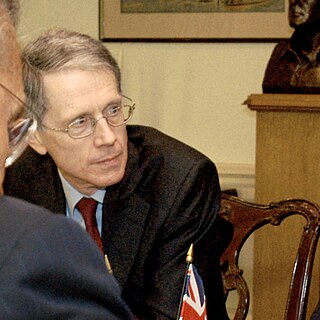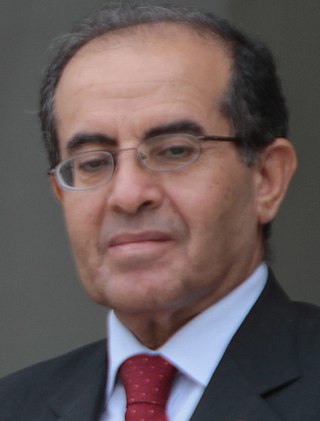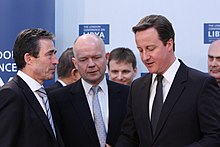The Commonwealth Heads of Government Meeting is a biennial summit meeting of the governmental leaders from all Commonwealth nations. Despite the name, the head of state may be present in the meeting instead of the head of government, especially among semi-presidential states. Every two years the meeting is held in a different member state and is chaired by that nation's respective prime minister or president, who becomes the Commonwealth Chair-in-Office until the next meeting. Queen Elizabeth II, who was the Head of the Commonwealth, attended every CHOGM beginning with Ottawa in 1973 until Perth in 2011, although her formal participation only began in 1997. She was represented by the Prince of Wales at the 2013 meeting as the 87-year-old monarch was curtailing long-distance travel. The Queen attended the 2015 summit in Malta and the 2018 summit in London, but was represented again by the Prince of Wales at the 2022 meeting in Rwanda.

Sir Malcolm Leslie Rifkind is a British politician who served in the cabinets of Margaret Thatcher and John Major from 1986 to 1997, and most recently as chair of the Intelligence and Security Committee of Parliament from 2010 to 2015. He is also known for his advocacy of a pro-European stance within his party's policies.
The Libyan Islamic Fighting Group (LIFG), also known as Al-Jama'a al-Islamiyyah al-Muqatilah bi-Libya, was an armed Islamist group. Militants participated in the 2011 Libyan Civil War as the Libyan Islamic Movement, and are involved in the Libyan Civil War as members of the Libya Shield Force. Alleged militants include alleged Al Qaeda organizer Abd al-Muhsin Al-Libi who now holds a key command position in the Libya Shield Force.

Sir David Geoffrey Manning, is a former British diplomat, who was the British Ambassador to the United States from 2003 to 2007. He authored the so-called "Manning Memo", that summarized the details of a meeting between American president George W. Bush and British prime minister Tony Blair during the run-up to the invasion of Iraq in 2003. Until 2019, he was appointed to the Household of the Duke and Duchess of Cambridge and the Duke and Duchess of Sussex.

Saif al-Islam Muammar al-Gaddafi is a Libyan political figure. He is the second son of the late Libyan leader Muammar Gaddafi and his second wife Safia Farkash. He was a part of his father's inner circle, performing public relations and diplomatic roles on his behalf. He publicly turned down his father's offer of the country's second highest post and held no official government position. According to United States Department of State officials in Tripoli, during his father's reign, he was the second most widely recognized person in Libya, being at times the de facto prime minister, and was mentioned as a possible successor, though he rejected this. An arrest warrant was issued for him on 27 June 2011 by the International Criminal Court (ICC) for charges of crimes against humanity against the Libyan people, for killing and persecuting civilians, under Articles 7(1)(a) and 7(1)(h) of the Rome statute. He denied the charges.
The Foreign Affairs Select Committee is one of many select committees of the British House of Commons, which scrutinises the expenditure, administration and policy of the Foreign, Commonwealth and Development Office.

Libya–United States relations are the bilateral relations between the State of Libya and the United States of America. Relations are today cordial and cooperative, with particularly strong security cooperation only after the 2012 attack on the US liaison office or mission in Benghazi. Furthermore, a Gallup poll conducted in March and April 2012 found that Libyans had "among the highest approval" of US leadership in the entire Middle East and North Africa region.

Relations between Libya and the United Kingdom were initially close and positive after the British Armed Forces helped rebel forces to topple Muammar Gaddafi's regime in the 2011 Libyan Civil War. British officials have visited Libya several times since then, including two visits by Prime Minister David Cameron on which large crowds turned out to welcome him. The British Armed Forces are also helping to train Libya's National Army as part of wider cooperation on security matters. Security conditions have deteriorated since 2014, when the United Kingdom suspended operations from their embassy in Tripoli, into a second civil war. In June 2022, the United Kingdom re-opened its embassy in Tripoli.

Mustafa Abdul Jalil is a Libyan politician who was the Chairman of the National Transitional Council from 5 March 2011 until its dissolution on 8 August 2012. This position meant he was de facto head of state during a transitional period after the fall of Muammar Gaddafi's government in the Libyan Civil War, and until the handover of power to the General National Congress.
The international reactions to the Libyan Civil War were the responses to the series of protests and military confrontations occurring in Libya against the government of Libya and its de facto head of state Muammar Gaddafi.

The National Transitional Council (NTC) was a transitional government established in the 2011 Libyan civil war. The rebel forces overthrew the Libyan Arab Jamahiriya of Muammar Gaddafi. The NTC governed Libya for a period of ten months after the end of the war, holding elections to a General National Congress on 7 July 2012, and handing power to the newly elected assembly on 8 August.

Mahmoud Jibril el-Warfally, also transcribed Jabril or Jebril or Gebril, was a Libyan politician who served as the interim Prime Minister of Libya for seven and a half months during the overthrow of Muammar Gaddafi and the Libyan Civil War, chairing the executive board of the National Transitional Council (NTC) from 5 March to 23 October 2011. He also served as the Head of International Affairs. As of July 2012, Jibril was the head of one of the largest political parties in Libya, the National Forces Alliance.

The foreign relations of Libya were largely reset at the end of the Libyan Civil War, with the overthrow of Muammar Gaddafi and the Second Libyan Civil War. The current Minister of Foreign Affairs since 15 March 2021 is Najla Mangoush. Although many foreign embassies in Tripoli closed down in 2014 due to the fighting, by the end of 2017 thirty diplomatic missions were reopened in the Libyan capital.
The Libya Contact Group was an international collective established to support the Libyan National Transitional Council in their effort to overthrow the regime of Muammar Gaddafi in Libya. It was hosted by western nations and members of the Arab League, and known by a variety of other names including the Friends of Libya and the International Contact Group for Libya.

The Syrian National Council, sometimes known as the Syrian National Transitional Council or the National Council of Syria, is a Syrian opposition coalition, based in Istanbul, Turkey, formed in August 2011 during the Syrian civil uprising against the government of Bashar al-Assad.

The Group of Friends of the Syrian People is an international diplomatic collective of countries and bodies convening periodically on the topic of Syria outside the U.N. Security Council. The collective was created in response to a Russian and Chinese veto on a Security Council resolution condemning Syria.

The Government of National Accord was an interim government for Libya that was formed under the terms of the Libyan Political Agreement, a United Nations–led initiative, signed on 17 December 2015. The agreement was unanimously endorsed by the United Nations Security Council, which welcomed the formation of a Presidency Council for Libya and recognized the Government of National Accord as the sole legitimate executive authority in Libya. On 31 December 2015, Chairman of the Libyan House of Representatives, Aguila Saleh Issa declared his support for the Libyan Political Agreement. The General National Congress has criticized the GNA on multiple fronts as biased in favor of its rival parliament the House of Representatives.

The Popular Front for the Liberation of Libya is a Gaddafi loyalist militia and political party that aims to elect Saif al-Islam Gaddafi, son of the late Libyan leader Muammar Gaddafi, as president of Libya.

The Libyan peace process was a series of meetings, agreements and actions that aimed to resolve the Second Libyan Civil War. Among these were the Skhirat agreement of December 2015 and the plans for the Libyan National Conference in April 2019 that were delayed because of the 2019–20 Western Libya campaign.













